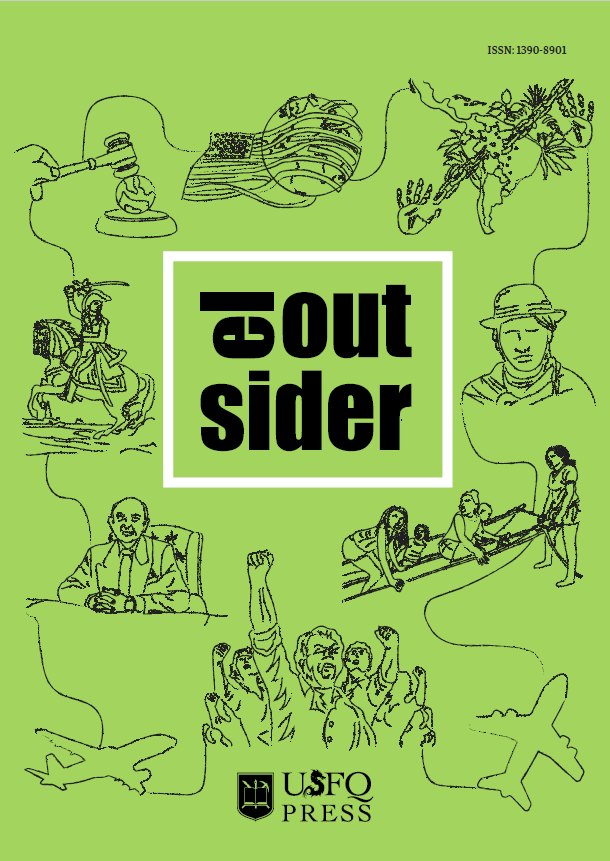A civilizational change: decoloniality, transdiplomacy, and norm localization
Main Article Content
Abstract
Superiority and hegemony based on reasoning, economics, and eurocentrism as a permanent precept has been established by states and societies; in consequence, other philosophies, from Asian and Indigenous cultures, are deemed not applicable and capable of fulfilling the "objectives'' of all individuals. This conception's legitimacy has led to ignoring the "Other" and disregarding their wisdom; however, the “other” has remained latent by the localization of globalized norms to indigenous worldview. From a critical point of view, this paper analyzes the civilizational change made by indigenous actors to the generalized social norms of the West. It is affirmed that the Andean worldview has remained in social action through localized norms that have made it possible to resolve issues from non-traditional and collectivist perspectives. It has been silently co-opted by prioritizing Western philosophy.
Article Details
References
Acharya, Amitav. 2004. “How Ideas Spread: Whose Norms Matter? Norm Localization and Institutional Change in Asian Regionalism.” International Organization 58, no. 2: 239-275. http://www.jstor.org/stable/3877858
Arévalo, Gabriel. 2017. “La diplomacia indígena: un enfoque transdiplomático.” Si Somos Americanos 17. no. 1: 141-169. https://dx.doi.org/10.4067/S0719-09482017000100141
Chihuailaf, Arauco. 2018. “Los indígenas en el escenario político de finales del siglo XX.” Amérique Latine Histoire et Mémoire, https://journals.openedition.org/alhim/7255
Comisión Económica para América Latina y el Caribe (CEPAL). 2017. “Jóvenes indígenas en acuerdos regionales e internacionales y panorama regional sobre la situación en salud.” Consultado el 14 de diciembre de 2020. https://www.cepal.org/sites/default/files/presentations/cepal-derechos_y_acuerdos-fdelpopolo.pdf
Coordinadora Andina de Organizaciones Indígenas (CAOI). 2020. “Pronunciamiento de la CAOI frente al coronavirus.” Abril de 2020. http://www.diplomaciaindigena.com/wp-content/uploads/2020/04/PRONUNCIAMIENTO-DE-LA-CAOI-POR-EL-CORONAVIRUS.pdf.pdf.
Cornwall, Andrea y Karen Brock. 2005. “What do Buzzwords do for Development Policy? A critical look at ‘participation’, ‘empowerment’ and ‘poverty reduction.” Third World Quarterly 26, no. 7: 1043 – 1060.
Cox, Robert. 1983. “Gramsci, Hegemony and International Relations: An Essay in Method.” Millennium: Journal of International Studies 12, no. 2: 162-175. https://doi.org/10.1177/03058298830120020701
Departamento de Asuntos Económicos y Sociales de las Naciones Unidas. 2020. “The Impact of COVID-19 on Indigenous Peoples.” División para el desarrollo social inclusivo: Resumen de políticas no. 70. https://www.un.org/development/desa/dpad/wp-content/uploads/sites/45/publication/PB_70.pdf
Díaz, Karla. 2011. “La Diplomacia De Los Pueblos, relaciones internacionales alternativas desde el Sur.” Revista Ciencia & Trópico 35, no. 1: 95-137. http://biblioteca.clacso.edu.ar/gsdl/cgi-bin/library.cgi?a=d&c=br/br-010&d=article884oai
Díaz, Karla. 2013. “Diplomacia De Los Pueblos, Propuesta Contra-Hegemónica en las Relaciones Internacionales.” Revista Búsquedas Políticas 2, no. 1: 213-237. http://repositorio.uahurtado.cl/handle/11242/5125
Escobar, Arturo. 1995. “Encountering development. The making and unmaking of the Third World.” Universidad de Princeton. http://cohd.cau.edu.cn/module/download/downfile.jsp?classid=0&filename=3c76535722844d0eaf14fe312a2d500e.pdf
Estermann, Josef. 2016. “Las Filosofías indígenas y el pensamiento afroamericano”. Filosofía Afro-Indo-Abiayalense 5, no. 25. http://editorialabiertafaia.com/pifilojs/index.php/FAIA/article/view/106/100
Finnemore, Martha, y Kathryn Skkink. 1998. “International Norm Dynamics and Political Change.” International Organization 52, no. 4: 887-917.
Foucault, Michel. 1978. The History of Sexuality. Traducido por Robert Hurley. Nueva York: Pantheon Books.
Garzón, Pedro. 2013. “Pueblos indígenas y decolonialidad sobre la colonización epistemológica occidental.” Andamios 10: 305-331.
Grishaeva, Elena. 2012. “Multiculturalism as a Central Concept of Multiethnic and Polycultural Society Studies.” Journal of Siberian Federal University: 916-922.
Gutiérrez, Jeanfreddy. 2020. “ONG venezolanas piden protocolo especial para atender comunidades indígenas por COVID-19”. Consultado el 14 de diciembre de 2020. https://www.amazoniasocioambiental.org/es/radar/ong-venezolanas-piden-protocolo-especial-para-atender-comunidades-indigenas-por-covid-19/
Holdo, Markus. 2019. “Cooptation and non-cooptation: elite strategies in response to social protest.” Social Movement Studies 18, no. 4: 444-462. DOI: 10.1080/14742837.2019.1577133
Lajo, Javier. 2006. Qhapaq Ñañ: la ruta Inka de sabiduría. Quito: Ediciones Abya-Yala.
Maldonado, Nelson. 2007. “Sobre la colonialidad del ser: contribuciones al desarrollo de un concepto.” En El giro decolonial: Reflexiones para una diversidad epistémica más allá del capitalismo global, 127-167. Siglo del Hombre Editores.
Orellana, Pablo. 2021. “Alternative Global Entanglements: ‘Detachment from Knowledge’ and the Limits of Decolonial Emancipation.” Millennium: Journal of International Studies 49, no. 3: 498-529. https://doi.org/10.1177/03058298211040162
Rojas, Carlos. 1999. “La América indígena y la filosofía”. Revista ABRA 20, no. 29: 16-23. https://www.revistas.una.ac.cr/index.php/abra/article/view/4292
Scauso, Marcos, Garrett FitzGerald, Arlene Tickner, Navnita Chadha Behera, Chengxin Pan, Chih-yu Shih y Kosuke Shimizu. 2020. “COVID-19, Democracies, and (De)Colonialities”. Democratic Theory 7, no. 2: 82-93. https://doi.org/10.3167/dt.2020.070211
Sharma, Ananya. 2021. “Decolonizing International Relations: Confronting Erasures through Indigenous Knowledge Systems.” International Studies 58, no. 1: 25-40.
Sorondo, Dennis. 2021. “Paradiplomacia y biodiplomacia: formas plurales de negociar la vida.” Si Somos Americanos. Revista de Estudios Transfronterizos 21, no. 1: 32-55.
Trownsell, Tamara. 2013. “Robust relationality: Lessons from the Ontology of complete interconnectedness for the field of International Relations.” Tesis doctoral, American University.
Trownsell, Tamara, Arlene Tickner, Amaya Querejazu, Jarrad Reddekop, Giorgio Shani, Kasuke Shimizu, Navnita Chadha, Anahita Arian. 2020. “Differing about Difference: Relational IR from around the World.” International Studies Perspectives: 1-40.
Wendt, Alexander. 1992. “Anarchy is what States Make of it: The Social Construction of Power Politics.” The MIT Press 46, no. 2: 391-425. http://links.jstor.org/sici?sici=0020-8183%28199221%2946%3A2%3C391%3AAIWSMO%3E2.0.CO%3B2-9

